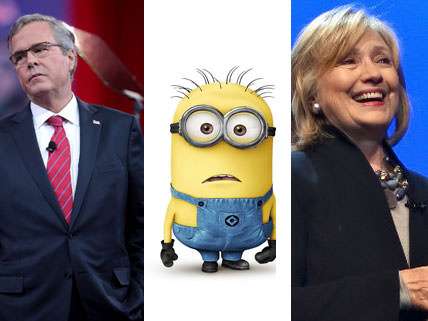Peter Suderman on the Connection Between Hollywood Movie Franchises and the 2016 Election
Welcome to franchise nation.

I'm the guest author on today's edition of The Transom, Ben Domenech's nifty, always valuable morning email newsletter.
In the lead item, I riff on this weekend's big movie franchise extender, Minions, and attempt to connect Hollywood's obsession with franchises and "pre-sold" properties to the 2016 election. Here's a snippet:
There's something bleak about going to the movies in an era of strip-mined nostalgia. This year alone has already feature updates and quasi-reboots of "Mad Max," "Jurassic Park," and "Terminator," with the J.J. Abrams-helmed "Star Wars" still to come.
…The problem these franchise expansions are trying to solve is that movies are incredibly expensive to advertise, but marketing is easier on films that involve recognizable properties. In Hollywood parlance, they're "pre-sold." Marketing costs for big-budget films have grown enormously in recent years, sometimes reaching 200 million dollars or more. Even a shoestring indie comedy can cost 20 million or more to market when picked up by a major studio. Hollywood wants to make movies about characters and properties you've already heard of because, well, you've already heard of them.
It's essentially the same problem faced by political candidates; more than anything, they need name recognition. That's why the front-runners for the two major political parties right now are Jeb Bush and Hillary Clinton. They're both pre-sold—extensions of preexisting political franchises that have already demonstrated some popularity and success. Where there were votes, there are more votes. Or at least that's the hope.
But there are dangers to this strategy in both politics and pop-culture. Mine too deep, extend the franchise too far, and you end with a dud that kills the brand. And if you stick with the same old familiar set of characters and ideas too long, you'll eventually find you don't have anything left to work with. You can only keep making "Terminator" movies, or nominating Bushes and Clintons, for so long before the public eventually loses interest—and you suddenly find you've got nothing left to sell.
Come for the lead essay, stay for the wealth of additional links. (I've also got a review of the just-okay animated kid's film in today's Washington Times.)


Show Comments (75)